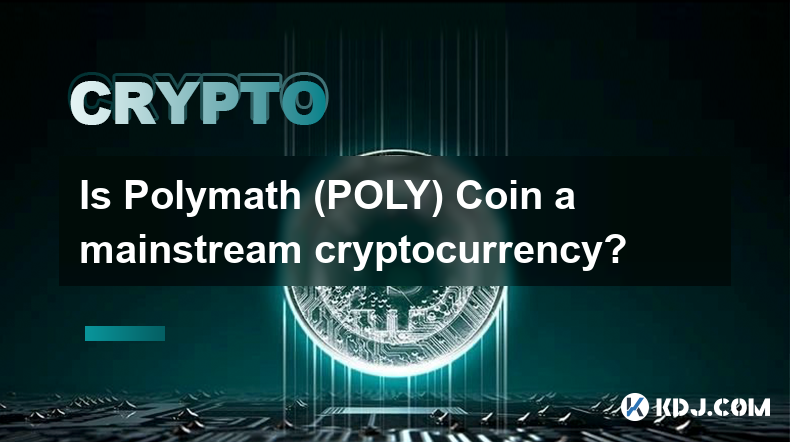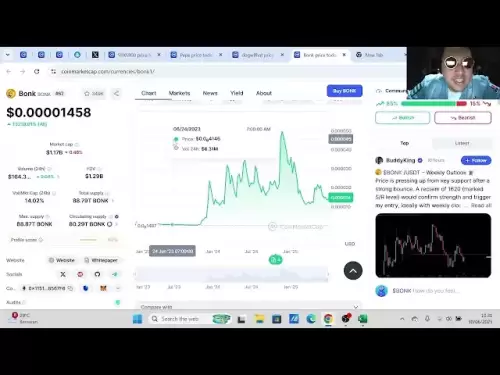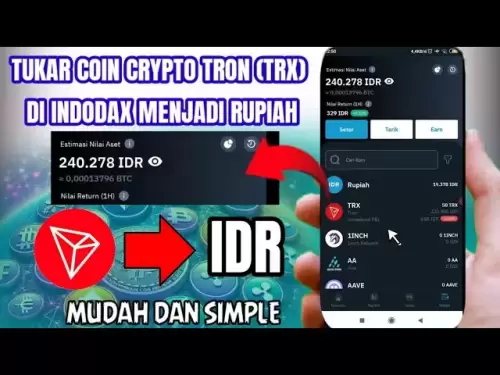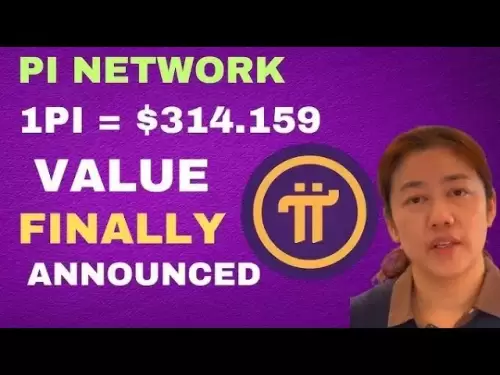-
 Bitcoin
Bitcoin $107,275.1551
-0.32% -
 Ethereum
Ethereum $2,485.3056
1.77% -
 Tether USDt
Tether USDt $1.0005
0.03% -
 XRP
XRP $2.2223
1.31% -
 BNB
BNB $657.7608
1.39% -
 Solana
Solana $156.3566
3.02% -
 USDC
USDC $0.9999
0.01% -
 TRON
TRON $0.2791
1.09% -
 Dogecoin
Dogecoin $0.1651
0.45% -
 Cardano
Cardano $0.5738
2.78% -
 Hyperliquid
Hyperliquid $40.2672
5.82% -
 Bitcoin Cash
Bitcoin Cash $517.5487
5.30% -
 Sui
Sui $2.7981
-0.40% -
 Chainlink
Chainlink $13.3500
-0.36% -
 UNUS SED LEO
UNUS SED LEO $9.1220
1.12% -
 Avalanche
Avalanche $17.9515
-0.32% -
 Stellar
Stellar $0.2361
-0.44% -
 Toncoin
Toncoin $2.9423
2.33% -
 Shiba Inu
Shiba Inu $0.0...01145
-0.68% -
 Litecoin
Litecoin $86.1693
-0.63% -
 Hedera
Hedera $0.1493
0.64% -
 Monero
Monero $315.1374
1.81% -
 Polkadot
Polkadot $3.4002
-0.73% -
 Dai
Dai $1.0001
0.03% -
 Bitget Token
Bitget Token $4.5413
-1.35% -
 Ethena USDe
Ethena USDe $1.0002
-0.01% -
 Uniswap
Uniswap $7.1733
-0.57% -
 Aave
Aave $274.0465
-0.23% -
 Pepe
Pepe $0.0...09810
2.24% -
 Pi
Pi $0.5101
-3.10%
Is Polymath (POLY) Coin a mainstream cryptocurrency?
Polymath (POLY), a blockchain platform for managing security tokens, faces challenges in becoming a mainstream cryptocurrency due to its lower market capitalization, specialized functionality, and potential regulatory hurdles.
Dec 26, 2024 at 02:17 pm

Key Points
- Understanding Mainstream Cryptocurrencies
- Factors Determining Mainstream Cryptocurrency Status
- Polymath (POLY) Coin Overview
- Polymath's Tokenomics and Market Performance
- Comparison to Established Mainstream Cryptocurrencies
- Challenges and Future Prospects of POLY Coin
Is Polymath (POLY) Coin a Mainstream Cryptocurrency?
Understanding Mainstream Cryptocurrencies
Mainstream cryptocurrencies refer to digital currencies that have gained widespread adoption and acceptance. Their relevance extends beyond niche communities and includes usage in mainstream financial transactions and adoption by major institutional players.
Factors Determining Mainstream Cryptocurrency Status
Several factors contribute to a cryptocurrency's mainstream status, including:
- Market capitalization and liquidity
- Scalability and transaction speed
- Security and consensus mechanisms
- Merchant acceptance and usability
- Regulatory compliance and institutional adoption
Polymath (POLY) Coin Overview
Polymath (POLY) is a blockchain-based platform designed to facilitate the issuance and management of security tokens. It aims to create a regulated environment for issuing and trading tokenized securities while ensuring investor protection.
Polymath's Tokenomics and Market Performance
POLY is the native utility token of the Polymath platform. It is used for:
- Paying transaction fees
- Facilitating token issuance and management
- Staking for governance and rewards
POLY's market performance has been influenced by factors such as the growth of the security token industry, regulatory developments, and market volatility.
Comparison to Established Mainstream Cryptocurrencies
Compared to established mainstream cryptocurrencies like Bitcoin and Ethereum, POLY:
- Has a lower market capitalization and liquidity
- Offers specialized functionality in the security token market
- May face regulatory challenges due to its association with security tokens
Challenges and Future Prospects of POLY Coin
POLY's wider adoption as a mainstream cryptocurrency could be influenced by:
- Expansion of the security token market and regulations
- Enhancements in platform scalability and usability
- Partnerships with financial institutions and regulatory bodies
- Competition from other blockchain-based platforms offering similar functionalities
FAQs
- What is the purpose of Polymath (POLY)?
Polymath is a platform for issuing and managing security tokens, providing a regulated environment for tokenized securities.
- What are the use cases of POLY tokens?
POLY tokens are used for paying fees, facilitating token issuance, staking for governance and rewards, and securing the Polymath platform.
- Is POLY a good investment?
The value of POLY is influenced by market demand, platform adoption, regulatory developments, and overall cryptocurrency market conditions. It is important to conduct thorough research and due diligence before investing in POLY or any cryptocurrency.
- Is POLY a mainstream cryptocurrency?
POLY's mainstream status is still emerging. While it has a niche market focus on security tokens, its broader acceptance and adoption as a mainstream cryptocurrency will depend on factors such as market growth, regulatory advancements, and competition.
Disclaimer:info@kdj.com
The information provided is not trading advice. kdj.com does not assume any responsibility for any investments made based on the information provided in this article. Cryptocurrencies are highly volatile and it is highly recommended that you invest with caution after thorough research!
If you believe that the content used on this website infringes your copyright, please contact us immediately (info@kdj.com) and we will delete it promptly.
- Coinbase, Altcoins, and Listings: What's the Buzz?
- 2025-07-01 00:30:11
- Chainlink's Bullish Signals: Investors Bet on Long-Term Value
- 2025-07-01 00:50:12
- CICADA Finance Soars on BNB Chain: A TGE Deep Dive
- 2025-07-01 01:30:11
- MicroStrategy's Bitcoin Bet: Holdings, Sell-Off Concerns, and S&P 500 Dreams
- 2025-07-01 01:30:11
- XRPL EVM Sidechain: Ethereum dApps Unleashed on XRP Ledger!
- 2025-07-01 01:35:11
- Bybit, Kraken, and Tokenized Stocks: A New Era for Trading?
- 2025-07-01 00:30:11
Related knowledge

How to customize USDT TRC20 mining fees? Flexible adjustment tutorial
Jun 13,2025 at 01:42am
Understanding USDT TRC20 Mining FeesMining fees on the TRON (TRC20) network are essential for processing transactions. Unlike Bitcoin or Ethereum, where miners directly validate transactions, TRON uses a delegated proof-of-stake (DPoS) mechanism. However, users still need to pay bandwidth and energy fees, which are collectively referred to as 'mining fe...

USDT TRC20 transaction is stuck? Solution summary
Jun 14,2025 at 11:15pm
Understanding USDT TRC20 TransactionsWhen users mention that a USDT TRC20 transaction is stuck, they typically refer to a situation where the transfer of Tether (USDT) on the TRON blockchain has not been confirmed for an extended period. This issue may arise due to various reasons such as network congestion, insufficient transaction fees, or wallet-rela...

How to cancel USDT TRC20 unconfirmed transactions? Operation guide
Jun 13,2025 at 11:01pm
Understanding USDT TRC20 Unconfirmed TransactionsWhen dealing with USDT TRC20 transactions, it’s crucial to understand what an unconfirmed transaction means. An unconfirmed transaction is one that has been broadcasted to the blockchain network but hasn’t yet been included in a block. This typically occurs due to low transaction fees or network congestio...

How to check USDT TRC20 balance? Introduction to multiple query methods
Jun 21,2025 at 02:42am
Understanding USDT TRC20 and Its ImportanceUSDT (Tether) is one of the most widely used stablecoins in the cryptocurrency market. It exists on multiple blockchain networks, including TRC20, which operates on the Tron (TRX) network. Checking your USDT TRC20 balance accurately is crucial for users who hold or transact with this asset. Whether you're sendi...

What to do if USDT TRC20 transfers are congested? Speed up trading skills
Jun 13,2025 at 09:56am
Understanding USDT TRC20 Transfer CongestionWhen transferring USDT TRC20, users may occasionally experience delays or congestion. This typically occurs due to network overload on the TRON blockchain, which hosts the TRC20 version of Tether. Unlike the ERC20 variant (which runs on Ethereum), TRC20 transactions are generally faster and cheaper, but during...

The relationship between USDT TRC20 and TRON chain: technical background analysis
Jun 12,2025 at 01:28pm
What is USDT TRC20?USDT TRC20 refers to the Tether (USDT) token issued on the TRON blockchain using the TRC-20 standard. Unlike the more commonly known ERC-20 version of USDT (which runs on Ethereum), the TRC-20 variant leverages the TRON network's infrastructure for faster and cheaper transactions. The emergence of this version came as part of Tether’s...

How to customize USDT TRC20 mining fees? Flexible adjustment tutorial
Jun 13,2025 at 01:42am
Understanding USDT TRC20 Mining FeesMining fees on the TRON (TRC20) network are essential for processing transactions. Unlike Bitcoin or Ethereum, where miners directly validate transactions, TRON uses a delegated proof-of-stake (DPoS) mechanism. However, users still need to pay bandwidth and energy fees, which are collectively referred to as 'mining fe...

USDT TRC20 transaction is stuck? Solution summary
Jun 14,2025 at 11:15pm
Understanding USDT TRC20 TransactionsWhen users mention that a USDT TRC20 transaction is stuck, they typically refer to a situation where the transfer of Tether (USDT) on the TRON blockchain has not been confirmed for an extended period. This issue may arise due to various reasons such as network congestion, insufficient transaction fees, or wallet-rela...

How to cancel USDT TRC20 unconfirmed transactions? Operation guide
Jun 13,2025 at 11:01pm
Understanding USDT TRC20 Unconfirmed TransactionsWhen dealing with USDT TRC20 transactions, it’s crucial to understand what an unconfirmed transaction means. An unconfirmed transaction is one that has been broadcasted to the blockchain network but hasn’t yet been included in a block. This typically occurs due to low transaction fees or network congestio...

How to check USDT TRC20 balance? Introduction to multiple query methods
Jun 21,2025 at 02:42am
Understanding USDT TRC20 and Its ImportanceUSDT (Tether) is one of the most widely used stablecoins in the cryptocurrency market. It exists on multiple blockchain networks, including TRC20, which operates on the Tron (TRX) network. Checking your USDT TRC20 balance accurately is crucial for users who hold or transact with this asset. Whether you're sendi...

What to do if USDT TRC20 transfers are congested? Speed up trading skills
Jun 13,2025 at 09:56am
Understanding USDT TRC20 Transfer CongestionWhen transferring USDT TRC20, users may occasionally experience delays or congestion. This typically occurs due to network overload on the TRON blockchain, which hosts the TRC20 version of Tether. Unlike the ERC20 variant (which runs on Ethereum), TRC20 transactions are generally faster and cheaper, but during...

The relationship between USDT TRC20 and TRON chain: technical background analysis
Jun 12,2025 at 01:28pm
What is USDT TRC20?USDT TRC20 refers to the Tether (USDT) token issued on the TRON blockchain using the TRC-20 standard. Unlike the more commonly known ERC-20 version of USDT (which runs on Ethereum), the TRC-20 variant leverages the TRON network's infrastructure for faster and cheaper transactions. The emergence of this version came as part of Tether’s...
See all articles

























































































